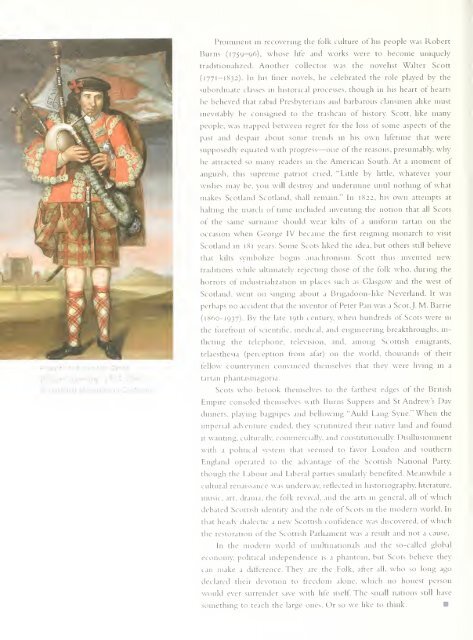SCOTLAND - Smithsonian Digital Repository - Smithsonian Institution
SCOTLAND - Smithsonian Digital Repository - Smithsonian Institution
SCOTLAND - Smithsonian Digital Repository - Smithsonian Institution
You also want an ePaper? Increase the reach of your titles
YUMPU automatically turns print PDFs into web optimized ePapers that Google loves.
Prominent m recovering the folk culture of his people was Robert<br />
Burns (1759—96), whose lite and works were to become unicjuely<br />
traditionalized. Another collector was the novelist Walter Scott<br />
(1771-1832). In his finer novels, he celebrated the role played by the<br />
subordinate classes in historical processes, though in his heart of hearts<br />
he believed that rabid Presbyterians and barbarous clansmen alike must<br />
inevitably be consigned to the trashcan of history. Scott, like many<br />
people, was trapped between regret for the loss of some aspects of the<br />
past and despair about some trends in his own lifetime that were<br />
supposedly equated with progress—one of the reasons, presumably, why<br />
he attracted so many readers in the American South. At a moment of<br />
anguish, this supreme patriot cried, "Little by little, whatever your<br />
wishes may be, you will destroy and undermine until nothing of what<br />
makes Scotland Scotland, shall remain." In 1S22, his own attempts at<br />
halting the march of time included inventing the notion that all<br />
Scots<br />
of the same surname should wear kilts of a uniform tartan on the<br />
occasion when George IV became the first<br />
reigning monarch to visit<br />
Scotland in 181 years. Some Scots liked the idea, but others still believe<br />
that kilts symbolize bogus anachronism. Scott thus invented new<br />
traditions while ultimately rejecting those of the folk who, during the<br />
horrors of inclustnalization in places such as Glasgow and the west of<br />
Scotland, went on singing about a Brigadoon-like Neverland. It was<br />
perhaps no accident that the inventor of Peter Pan was a Scot, J.<br />
M. Barrie<br />
(1860-1937). Bv the late 19th century, when hundreds of Scots were in<br />
the forefront of scientific, medical, and engineering breakthroughs, inflicting<br />
the telephone, television, and, among Scottish emigrants,<br />
telaesthesia (perception from afar) on the world, thousands of their<br />
Piper to the Laird of Grant,<br />
William Ctjmmin.s, 1714. Photo<br />
© Nat of Scotland<br />
fellow countrymen convinced themselves that they were living in a<br />
tartan phantasmagoria.<br />
Scots who betook themselves to the farthest edges of the British<br />
Empire consoled themselves with Burns Suppers and St Andrew's Day<br />
dinners, playing bagpipes and bellowing "Auld Lang Syne." When the<br />
imperial adventure ended, they scrutinized their native land and found<br />
It<br />
wanting, culturally, commercially, and constitutionally. DisiUusionment<br />
with a political system that seemed to favor London and southern<br />
England operated to the advantage of the Scottish National Party,<br />
though the Labour and Liberal parties similarly benefited. Meanwhile a<br />
cultural renaissance was underway, reflected in historiography, literature,<br />
music, art, drama, the folk revival, and the arts in general, all of which<br />
debated Scottish identirs' and the role of Scots m the modern world. In<br />
that headv dialectic a new Scottish confidence was discovered, of which<br />
the restoration of the Scottish Parliament was a result and not a cause.<br />
In the modern world of multinationals and the so-called global<br />
economy, political independence is a phantom, but Scots believe they<br />
can make a difference. They are the Folk, after all, who so long ago<br />
declared their devotion to freedom alone, which no honest person<br />
would ever surrender save with life itself The small nations still have<br />
something to teach the large ones. Or so we like<br />
to think.
















